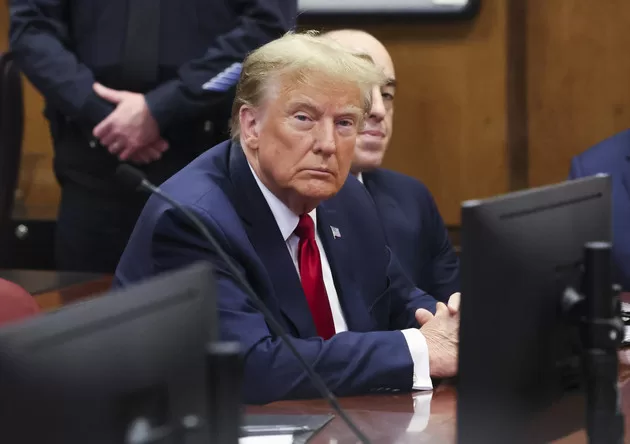The lawsuits — brought by members of Congress and police officers scarred by the attack — have been pending since 2021 but delayed amid Trump’s bid for the courts to declare him immune from lawsuits related to his actions as president.
For now, that means
a Washington, D.C., appeals court ruling that found Trump could be sued for his role in stoking the violence on Jan. 6 will stand. The unanimous ruling of the three-judge panel, which included a Trump-nominated judge, concluded that Trump’s remarks to supporters on Jan. 6 appeared to be delivered in his capacity as a candidate for reelection — not in his official capacity as president.
But the decision from the D.C. Circuit Court of Appeals did not totally slam the door on Trump attempting to prove that the event was official.
Under an agreement with the plaintiffs in those cases, Trump had a Thursday deadline to halt the effect of the appeals court decision by filing an appeal with the Supreme Court. None was filed as of Thursday evening, and his aides indicated none was expected.
But Trump’s allies say he is leaving the door open to reviving a challenge to the ruling later in the process. He could try another appeal after the next round of fact-finding is complete, and the trial judge issues another ruling on whether the cases can proceed.
Even without the civil immunity fight, the Supreme Court is already dealing with a trio of cases that could have a major impact on Donald Trump and his political viability.
|
Brendan McDermid/AP
“President Trump will continue to fight for Presidential Immunity across the spectrum,” said Steven Cheung, a spokesperson for Trump’s 2024 presidential campaign.
Even without the civil immunity fight, the Supreme Court is already dealing with a trio of cases that could have a major impact on Trump and his political viability.
Last week, the justices
spent more than two hours hearing arguments about whether to uphold or overturn a Colorado Supreme Court decision that Trump is ineligible to appear on the ballot because his actions related to Jan. 6 rendered him an insurrectionist.
The U.S. Supreme Court has also
agreed to hear a case that from another Jan. 6 criminal defendant that has the potential to knock out two of four charges Trump faces in the election-subversion indictment prosecutors obtained against him last year.
And the justices could discuss at a conference Friday whether to keep that trial on hold while they consider
Trump’s claim that former presidents enjoy broad immunity from criminal prosecution over matters even tangentially related to their official duties.
Though Trump’s bid for criminal immunity carries more urgent and immediate stakes, the fight over whether he can face financial penalties for the same events has been pending significantly longer.
Nearly two years ago, U.S. District Court Judge Amit Mehta
rejected Trump’s bid to wield presidential immunity to dismiss several of the suits stemming from Jan. 6. Mehta said Trump’s speech at the Ellipse might have ordinarily been protected by the First Amendment.
However, the judge said indications that Trump knew about weapons in the crowd or other imminent threats of violence meant it was possible Trump’s actions and remarks taken as a whole might not be protected political speech.
“From these alleged facts, it is at least plausible to infer that, when he called on rally-goers to march to the Capitol, the President did so with the goal of disrupting lawmakers’ efforts to certify the Electoral College votes,” Mehta wrote, an appointee of President Barack Obama. “The Oath Keepers, the Proud Boys, and others who forced their way into the Capitol building plainly shared in that unlawful goal.”
